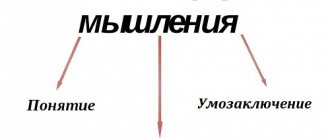In this article I will talk about how important the first impression of a person is and give several reasoned examples. It is this assessment that determines what kind of relationships you will develop in the future. If you have problems at the dating stage, it will be extremely difficult to eliminate them in the future. Such situations can negatively affect both the establishment of business connections and personal life.
Why is an assessment needed?
The main task of assessment is self-control and self-government, coupled with identifying oneself with society. We begin to talk about value judgment when it comes to concepts such as protecting honor and dignity. But most often this concept is used precisely in the scientific field in order to define certain facts and theories.
Definitions
A value judgment is a person’s subjective assessment of any environmental phenomenon. Simply put, it is an opinion that is most often expressed using evaluative concepts. We are used to using them in everyday life, for example, for better or worse. In this way we explain our personal position in relation to a specific object, person or phenomenon.
The first impression – is it the most correct one: why can it be deceptive?
Misconceptions often happen, especially if a new acquaintance has done his best to prepare for the meeting. There are 3 main groups of inaccuracies:
- Attitude. It may be wrong for a fairly simple reason. Each of us considers ourselves significant, respected, and at some points delightful, and subconsciously we also treat everyone around us when we first meet. Naturally, it is very easy to overestimate the personal qualities of the interlocutor. The disappointment will be very unpleasant.
- Attractive appearance. Attractive people are perceived as warm, friendly, helpful, and intelligent. The subconscious mind cannot work any other way. To avoid mistakes, it is enough to continue communication, and pretty soon the true state of affairs will become clear.
- Dominance over the interlocutor. When evaluating clothes, accessories and other external attributes, we can attribute him to our social class or place him higher/lower than ourselves. In fact, many successful people avoid spending money on expensive brands, while the less wealthy take out loans to buy a phone, clothes, or a car that they cannot afford.
None of us are immune from mistakes. It will be possible to find out later what the first impression of a person may be - right or wrong, sometimes it takes a lot of time. Therefore, do not try to immediately cut off ties if the stranger turns out to be categorically unlikable to you - give him a second chance.
What kinds of judgments are there?
Value judgments are usually divided according to their direction. We can talk about three types:
- Factual or objective judgments record those events that actually happened in life. Simply put, an event that was captured by people or special devices, and also stored in any form or has evidence. An actual theoretical value judgment may be the result of one's own experience or of another's. This also includes events that occur not only in real life, but can also be the plot of books, movies, advertising, and so on. For example, Harry Potter is a wizard who studied at Hogwarts. This is definitely a fact, but a fact that happened in a fantasy world.
- A value judgment is a subjective opinion, which may not even belong to a specific person, but to an entire society. This type of judgment reflects an individual perception of a fact.
- Theoretical judgments are information that is based on the experience of more than one generation. In order to have an actual evaluative theoretical character of judgments, it is absolutely not necessary to be a scientist or understand science. Even the most ordinary person can gain scientific experience.
Scientific experience
To understand this issue, you need to determine what scientific experience is and where to get it. Everything is simple here, usually these are any events, concepts, theories, schemes that are presented by competent people in an orderly and specific manner. The amount of knowledge in the world is crazy, but only those that have received approval from the scientific community and have been published in special publications are recognized as scientific. Theoretical judgments should not be confused with the most ordinary facts. After all, a phenomenon is a specific event, and a theory is a scheme of actions. Each person gives certain phenomena and objects an independent assessment, and it is considered as such, even if this judgment is imposed on him by the world around him.
Declension of the noun opinion
| Case | Question | Unit | Mn. number |
| Nominative | (who what?) | opinion | opinions |
| Genitive | (who, what?) | opinions | opinions |
| Dative | (to whom; to what?) | opinion | opinions |
| Accusative | (who, what?) | opinion | opinions |
| Instrumental | (by whom, what?) | opinion | opinions |
| Prepositional | (About who about what?) | opinion | opinions |
Types of evaluative opinion
Psychology characterizes value judgments as follows. They are: correct/incorrect, adequate/inadequate, optimal/suboptimal. A person characterizes each of his factual judgments and value judgments in accordance with these three positions. Even though a person may make mistakes, he always considers his opinion to be correct, adequate and optimal. Each of these characteristics has its own properties. For example, a person can form an opinion about the correctness of another person’s judgment if he compares it with the patterns of events. As for adequacy, we compare the judgment with reality, with existing facts. The optimality of an opinion is determined by the benefit of the opinion to the one who expresses this opinion. For example, if a person decides to lie, such an opinion can be called optimal if, thanks to his lie, the person achieves his goal. Examples of an inadequate and suboptimal value judgment may be as follows: something unpleasant happened to a person, but he looked at the situation with optimism and found positive aspects. In the future, this judgment helped him achieve new goals and change his life for the better. By assessing the surrounding reality, a person can manage and control himself, thereby shaping his own reality. If we talk about the most important mission of value judgment, then this is not the fight for the truth, but the justification of one’s own thoughts, words, and actions.
What types of statements are there?
A proposition is a proposition that is expressed through narration. Typically we deal with the following types of opinions:
- Evaluative - usually involves an open or indirect expressed opinion of a particular person about what is happening from the perspective of whether it is good or bad. If the presence of a value judgment is indirect, then it can be identified only by asking additional questions to the speaker.
- Substantiating is a judgment that is supported by arguments and facts.
- Analytical – a judgment that notes the specific need for the existence of a particular phenomenon or object, its analysis and the degree of connection with other objects.
- Existential is the most common opinion in its pure form. Used to indicate the existence of a certain fact without a specific explanation.
- Definition is a judgment, the essence of which is to reveal the essence of a specific phenomenon or object.
If an opinion incorporates several of the above characteristics at once, it means it is constructive.
Educational process
Value judgment is of no small importance in the educational process. In fact, the teacher’s activity is aimed at assessment. Grades are a kind of indicator of the achievement of certain results by students, which act on students as a motivation for action. And if everything is clear with psychology, then in pedagogy there is its own classification of value judgments.
- Destructive – a teacher’s opinion about a student, which negatively affects the latter’s self-esteem. Typically, such judgments are filled with expressive vocabulary and do not in any way push the student to achieve better results; on the contrary, they contribute to the fact that he begins to act out of spite.
- A limiting judgment is based on comparing certain results with some established truth. If a student deviates from this truth, he will be reprimanded. Thus, his activities are limited to certain limits established by the teacher.
- Supportive value judgment is the most effective. For example, teachers can praise even the most careless student with the goal that he will at least glance at the textbook.
- Developmental value judgment is preferred in education. If the previous option puts the student in a certain comfort zone, where he is always ready for praise, then in this case the teacher’s comments direct the student on the path to further growth and movement forward.
As we see, value judgments play a major role in the educational process.
What it is
This is a certain image, an emotional attitude that is formed at the moment when two people meet for the first time. The emotions received are remembered and emerge again with each further interaction, which is why they have an impact.
The most important thing is that it only takes a few seconds to form the sensation, and within two minutes it will finally take hold. Several determining factors are important:
- The body of the interlocutor, namely his posture, facial expressions, gestures.
- Voice along with timbre and intonation.
- Spoken words.
- Personal characteristics are also important, but it is almost impossible to discern them in such a short time.
Examples
Scientific interpretation of facts does not take place without evaluation and expression of opinion. Every scientist, after analyzing and studying any information, must express his opinion, which he formed during the research process. That is why any material has true social facts that are mixed with the subjective opinion of the author. It is possible to identify value judgments in scientific publications through the use of the following constructions in the text: in all likelihood, it seems, most likely, there is reason to assume, I think, my point of view, and so on. Often such judgments can become the basis for explaining the influence of events on other objects or phenomena. They can be identified by the presence of the following phrases in the text: this situation can become an example, this fact explains the following, based on the above, a conclusion can be drawn, and so on.
Connection with other words
Words ending with -opinion:
- blackout
- darkening
- conceit
- doubt
Hypo-hyperonymic relationships
opinion reputation
What is an opinion (adjectives)?
Selection of adjectives for words based on the Russian language.
public own general other personal widespread special other high definite various opposite alien erroneous such similar good biased various kind flattering universal common perfect original authoritative wide indifferent private unflattering subjective professional solid generally accepted low world perverse unanimous unanimous bad favorable final correct modest bad interesting incorrect negative known any former false important true satisfied impartial best exaggerated sincere frank negative necessary low contradictory
What can an opinion do? What can you do with opinion (verbs)?
Selection of verbs for words based on the Russian language.
change turn out to be possessed have inclined to change say coincide adhere to confirm come to follow mean to separate coincide interest play have to demand reduce incline to outgrow to converge to be based to strengthen to remain worth to force to diverge to prescribe to acquire to develop to converge to appear to change become obsolete to seem to blame to form decide to lead to seem to depend begin to find spread appear arise consider prevail disperse get consist happen speak out exchange hinder condemn speak out reason allow render
Associations for the word opinion
reason given question attitude matter benefit side reason topic help people basis account council Russia opinion calculation member coelom propaganda street country prince majority presence west end creature row meeting city problem eye face America choice of light quality court society case dispute England colleague village bob information current conversation subject finland hand internet school page paris senate master root dependence foundation leadership general sema
Synonyms for opinion
aphorism view appeal view retribution reward conclusion hypothesis foresight guess insight dignity conclusion law spectacle idea image saying end critic worldview morality thought intention moral teaching environment review attitude paradox posture position thought understanding concept statement proposal representation principle request placement reasoning situation consideration state court judgment thesis satisfaction inference discretion doctrine calculation report discretion
Hyponyms for opinion
- reputation prejudice
Scope of use of the word opinion
General vocabulary Diplomatic term Legal term Advertising Politics











